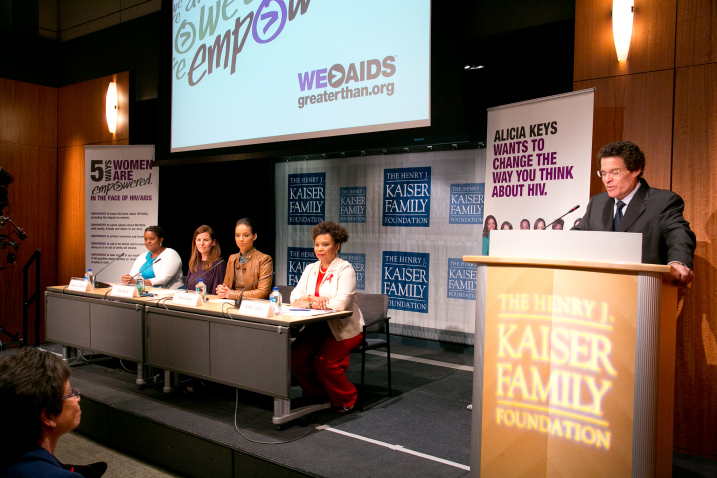
Gay and Bisexual Men See HIV as the Top Health Issue Facing Their Community, But Majorities Are Not Personally Worried About Getting Infected & Not Getting Tested Regularly
From the Kaiser Family Foundation:
Most Are Unaware of New Prevention Options, Such as PrEP, or Current Treatment Recommendations

Photo credit: imagelinkphoto.com/Dennis Kan
MENLO PARK, CA – More than thirty years into the HIV/AIDS epidemic, and at a time when infections among gay and bisexual men are on the rise in the U.S., a new national survey of gay and bisexual men bythe Kaiser Family Foundation finds that though HIV/AIDS is named as the number one health issue facing their population, a majority (56%) are not personally concerned about becoming infected, and relatively few report having been tested recently.
Only three in 10 (30%) gay and bisexual men say they were tested for HIV within the last year, including 19 percent who report being tested within the last six months (these figures exclude the 10% who self-identify as HIV-positive). Gay and bisexual men under the age of 35 are twice as likely as those who are older to report never having been tested for HIV (44% vs. 21%). The CDC recommends at least annual HIV testing for this population with more frequent testing advised by many health departments.
Only about a quarter (26%) know about PrEP (pre-exposure prophylaxis), a daily pill that people who are HIV-negative can take to lower their risk of becoming infected. Eight in 10 (80%) say they have heard “only a little” or “nothing at all” about the new prevention option.
Fewer than half (46%) of gay and bisexual men are aware that the current guidelines for people with HIV are to start antiretroviral (ARV) treatment as soon as they are diagnosed, and only a quarter (25%) know about treatment as prevention. (Research shows that taking consistent ARV treatment can reduce the risk of passing HIV on to others by as much as 96 percent.)
More than half (56%) say that a doctor has never recommended they get tested for HIV, and six in 10 (61%) say they rarely or never discuss HIV when they visit their doctor.
“These survey results underscore the importance of getting the word out among gay and bisexual men about risk and new treatment and prevention options,” said Kaiser Family Foundation President and CEO Drew Altman, Ph.D.
Just a third (32%) realize that new infections are on the rise among gay and bisexual men. One in four (22%) think the number is decreasing and the rest either think the situation is staying the same or acknowledge that they don’t know.
Reflecting the disproportionate impact of HIV in communities of color, gay and bisexual men who are members of racial and ethnic minority groups are more likely to say that HIV/AIDS is a significant issue for them personally than white gay men (64% versus 42%) and to say that they are personally concerned about becoming infected (53% versus 28%).
Overall, three quarters (75%) say that gay and bisexual men not knowing their HIV status is a major reason it has been hard to control the spread of HIV among this group. Complacency about HIV in the gay community (62%) and HIV-related stigma (56 percent) are also named by majorities as major factors.
Many say HIV is not a topic that comes up often, if all, even with those closest to them. Three quarters (68%) say they “rarely” or “never” discuss HIV with friends, and large shares report not talking much about the disease with casual sexual partners (50%) or with long-term partners (60%).
While most gay and bisexual men (76%) say they are comfortable having non-sexual relationships with HIV-positive persons, large majorities say they would be uncomfortable with more intimate relationships, including being in a long-term sexual relationship (66%) and having casual sex (77%) with someone who is HIV-positive. Gay and bisexual men under the age of 35 are more likely to say they would be uncomfortable having relationships, sexual or otherwise, with someone who is HIV-positive. Nearly two in five (37%) gay and bisexual men who did not identify as HIV-positive themselves say they have decided not to pursue a sexual relationship specifically because the person was HIV-positive.
Just over half (53%) report being in a committed relationship, including one in five (20%) who say they are married. Twelve percent live in a household with at least one child under the age of 18.
Gay and bisexual men under the age of 35 are less likely to report personal connections to HIV than those who are older. Nearly half (47%) of gay and bisexual men 35 and older say they have lost someone close to them to the disease, compared to only 8 percent of those who are younger. Overall, half (49%) of gay and bisexual men say they personally know someone living with HIV and one in three (32 percent) have had someone close to them who has died.
25 Young Gay Men. 25 Inspiring Stories.
Powerful Personal Videos Reveal the Impact of HIV And Urge Others to #SpeakOutHIV
MENLO PARK, CA – Twenty-five young gay men get real about HIV as part of #SpeakOutHIV, a campaign from Greater Than AIDS. The group is encouraging people to break the silence around HIV on social media in the two weeks between National Gay Men’s HIV/AIDS Awareness Day (September 27) and National Coming Out Day (October 11).
Anchored by a series of powerful personal videos recorded by men who are 25 or younger, #SpeakOutHIV challenges people to post their own stories about HIV on YouTube and share through Twitter, Facebook and other social media platforms as part of a collective effort to promote more open discussion about the issue.
The campaign comes at a critical time. New HIV infections are rising among young gay men. The U.S. Centers for Disease Control and Prevention (CDC) reported a 22 percent increase in new infections among gay men ages 13-24 between 2008 and 2010. Overall, young gay men account for one in five new infections in the United States, a share far greater than their representation in the population.
“Despite the continued impact of HIV, gay and bisexual men are not talking about HIV even with those closest to them,” noted Tina Hoff, Senior Vice President and Director of Health Communication and Media Partnerships, Kaiser Family Foundation – a co-founding partner in Greater Than AIDS. “#SpeakOutHIV is about promoting a more open dialogue about HIV in all aspects of life, in relationships, with health care providers and within the community generally.”
They offer unfiltered, intimate accounts about how HIV has affected them and what they want others to know about the disease. They come from regions with high rates of HIV, including the South. The majority are men of color. About one third are HIV positive.
They created their videos with cellphones and other personal devices this month at a Speak Out digital storytelling workshop organized by Greater Than AIDS in Washington, DC. “Once the courageous stories about coming out, HIV-diagnosis, isolation, self-esteem, and the like were shared, I learned from these young men that my story is not so uncommon,” said Jai, an HIV/AIDS educator from Dallas who helped facilitate the workshop and serves as a Greater Than AIDS Speak Out ambassador. “The stories and our shared experience linked us.”
#SpeakOutHIV is part of a broader Speak Out campaign, launched last fall by Greater Than AIDS, to engage the lesbian, gay, bisexual and transgender (LGBT) community in response to the silence and stigma surrounding HIV. The cross-platform campaign, which features HIV-positive and HIV-negative gay men encourages more open communication about the disease in personal relationships, as well as with healthcare providers and within the community.
AIDS United, Black AIDS Institute and the National Alliance of State and Territorial AIDS Directors helped organize the workshop, along with the Kaiser Family Foundation. Funding was provided by the Ford Foundation and Elton John AIDS Foundation.
For more information about Greater Than AIDS and all the Speak Out elements, including #SpeakOutHIV, visit: www.greaterthan.org/speak-out.











Comments